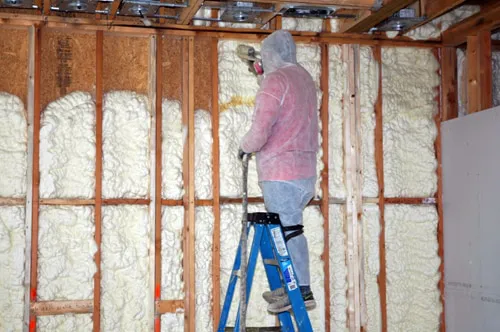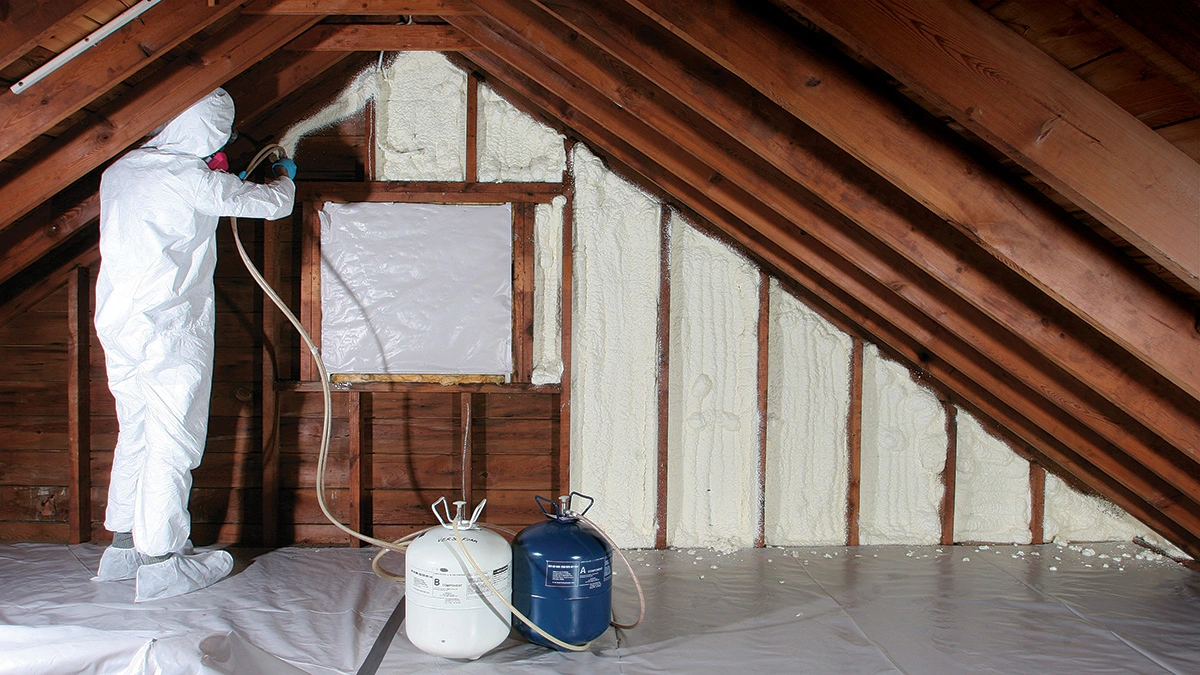
The Advantages of Spray Foam Roof Insulation
Spray foam roof insulation is well-known for households wishing to lower power bills and increase energy efficiency. This liquid solidifies this insulation into foam, forming a smooth barrier that prevents moisture intrusion and air leaks.
Properly insulating roofs is essential for several reasons. First, keeping heat from fleeing in the winter and entering the summer contributes to the year-round maintenance of a comfortable indoor temperature. Significant savings on heating and cooling expenses may result from this. Furthermore, a well-insulated roof can help a roof last longer by lowering the possibility of ice dams and moisture damage.
Spray foam roof insulation is an economical and effective solution for raising your house's energy efficiency. Because of its easy application and capacity to close gaps, it's an excellent option for homeowners who want to lower their energy costs and lessen their carbon footprint.
Applying it results in an airtight barrier that stops air from escaping or entering the house because it expands to fill up cracks and spaces. This sealing action depends on maintaining a constant interior temperature and lessening the strain on heating and cooling systems.
By stopping air leaks, spray foam insulation can drastically lower heating and cooling expenses. It lessens the need for continuous heating in the winter by helping to retain the warm air inside, and it lessens the need for air conditioning in the summer by keeping hot exterior air from leaking in. The outcomes are decreased energy use and decreased utility costs.
Moreover, spray foam insulation's air-sealing qualities can enhance indoor air quality by limiting the entry of outside allergens and pollutants. This can lead to a healthier and more comfortable living environment for you and your family.
Spray foam insulation is a highly effective solution for sealing air leaks and improving energy efficiency. Because it can lower heating and cooling expenses, homeowners who want to cut costs and lessen their carbon footprint frequently choose it.
Because spray foam insulation can fit any shape or size, it provides a seamless approach to insulating roofs. This allows it to seal even the smallest cracks and gaps, creating a constant insulation layer.
The ability of spray foam insulation to conform to any shape or size of roof makes it ideal for irregular or hard-to-reach areas. It can be sprayed over the roof's underside to create a seamless barrier that does not require extra caulking or sealing. This seamless application ensures no gaps or seams in the insulation, reducing the risk of air leakage and moisture infiltration.
Spray foam insulation is cost-effective and adaptable for roofing insulation. Because of its simplicity and adjustability, homeowners who wish to reduce their energy costs for heating and cooling can find it a popular choice.
Spray foam insulation's closed-cell structure provides excellent resistance to water and moisture. Unlike traditional insulation materials, which can absorb water and become less effective over time, spray foam repels water, preventing moisture buildup and mold growth.
This water and moisture resistance makes spray foam insulation ideal for areas prone to high humidity or moisture, such as roofs. Spray foam insulation helps safeguard the house's structural integrity and the roof's integrity by forming a barrier that keeps water from leaking in.
Furthermore, by halting the development of mold and mildew, spray foam insulation can enhance the quality of indoor air. Because mold grows best in moist conditions, conventional insulating materials can be a haven for mold spores. Spray foam insulation keeps your home healthier for you and your family by avoiding moisture buildup.
Spray foam insulation's water and moisture resistance make it a durable and effective solution for insulating roofs and other home areas. Its ability to divert water and prevent moisture buildup safeguards the home's structure and encourages a healthier indoor environment.

Spray foam insulation is a dependable option for homeowners searching for a long-term insulation solution because of its reputation for longevity and durability. When placed and maintained correctly, spray foam insulation offers constant thermal performance and energy savings for the duration of the building.
One of the key factors contributing to the longevity of spray foam insulation is its resilience against weather and environmental factors. Unlike traditional insulation materials that can degrade over time due to exposure to moisture, UV radiation, and temperature fluctuations, spray foam insulation maintains its integrity and performance, even in harsh conditions.
Additionally, spray foam insulation's ability to adhere to surfaces and fill gaps and cracks helps protect against air and moisture infiltration, further enhancing its durability. By reducing strain on heating and cooling systems, this seamless application creates a continuous barrier that aids in the preservation of a comfortable indoor environment.
Spray foam insulation's longevity and durability make it a cost-effective and sustainable choice for homeowners. Its ability to withstand weather and environmental factors ensures that it will continue providing energy savings and thermal comfort for years.
Spray foam insulation can have a positive environmental impact due to its ability to lower energy consumption and reduce carbon footprint. By providing an effective thermal barrier, spray foam insulation helps reduce the energy needed to heat and cool a home, lowering utility bills and reducing greenhouse gas emissions.
Additionally, spray foam insulation is made from sustainable and recyclable materials. The foam is often made from renewable resources such as soybean oil or recycled plastic, reducing the reliance on fossil fuels. Moreover, spray foam insulation has a lower environmental impact because it may be recycled at the end of its life cycle.
Another way that spray foam insulation benefits the environment is by improving indoor air quality. It seals cracks and gaps to keep allergens and pollutants from the outside, making the interior atmosphere healthier for occupants.
Spray foam insulation can significantly reduce buildings' environmental impact. It is an eco-friendly option for households trying to lessen their carbon footprint because of its capacity to employ sustainable materials, consume less electricity, and enhance indoor air quality.
Spray foam insulation can significantly enhance indoor air quality by decreasing the amount of outside allergens and pollutants that penetrate indoor spaces. By sealing cracks and gaps in the walls, ceiling, and flooring, spray foam insulation keeps outside contaminants out of a house, making the interior climate healthier for residents, particularly those with respiratory or allergy problems.
Additionally, spray foam insulation can help reduce the buildup of indoor pollutants.
Conventional insulation materials, such as fiberglass, have the potential to retain dust, pollen, and other allergens, which the HVAC system of the home can then circulate. Spray foam insulation's air-sealing properties help prevent the buildup of these pollutants, leading to cleaner indoor air.
In addition to enhancing indoor air quality, spray foam insulation can make a home more pleasant. Reduced exposure to allergens and pollutants can help alleviate symptoms such as coughing, sneezing, and congestion, improving occupants' overall health and well-being.
Spray foam insulation's ability to keep allergens and outside pollutants out of the house while lowering internal pollutants makes it valuable for improving indoor air quality. Because of its air-sealing qualities, homes and their families can live more comfortably and healthily.
FAQs
1. What is spray foam roof insulation?
Spray foam roof insulation is sprayed onto the underside to create a seamless barrier that helps prevent air leakage and moisture infiltration.
2. How does spray foam insulation improve energy efficiency?
Spray foam insulation seals gaps and cracks in the roof, preventing air from escaping or entering the home.
3. Is spray foam insulation water and moisture-resistant?
Yes, spray foam insulation has a closed-cell structure that repels water, preventing moisture buildup and mold growth. This makes it ideal for areas prone to high humidity or moisture.
4. How long does spray foam insulation last?
When installed and maintained correctly, Spray foam insulation offers continuous thermal performance and energy savings for the duration of the building.
5. Is spray foam insulation environmentally friendly?
Yes, spray foam insulation can have a positive environmental impact. It reduces energy consumption, lowers carbon footprint, and is made from sustainable and recyclable materials. Additionally, reducing pollutants and allergens enhances the quality of indoor air.
Conclusion
homeowners wishing to upgrade their properties can reap several advantages from spray foam insulation. Spray foam insulation offers a complete answer for insulation demands, including water resistance, longevity, and enhanced indoor air quality and energy efficiency. It is a flexible and long-lasting option for roofs and other household spaces because of its capacity to repel water, fill gaps and fractures, and adapt to any shape or size.
For a consultation and to enjoy the advantages of spray foam insulation, contact us right now. Our team of professionals can evaluate your insulation needs and offer a tailored solution that satisfies your needs and budget with spray foam insulation, bid excessive energy costs farewell, and welcome you to a more cozy and practical house.
Reach Out To Spray Foam Insulation Westminster
Delivering Quality Insulation Solutions in Westminster, Colorado
Call us today!